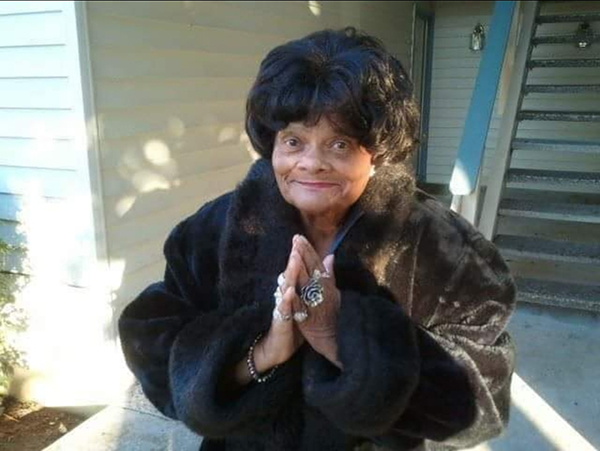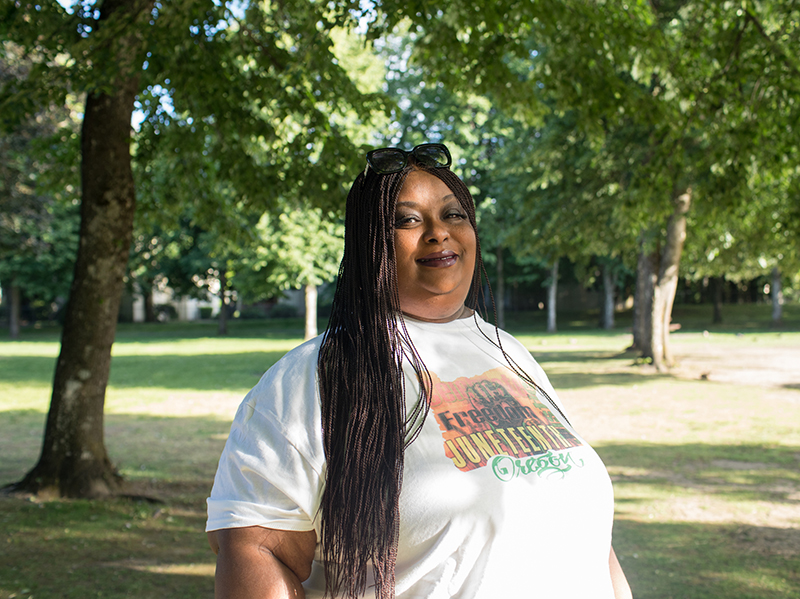This story was updated June 17 to add that a new law now makes Juneteenth a federal holiday.
Clara Peoples was working at the Kaiser shipyards in 1945 when she ushered in her first celebration of Juneteenth in Portland.
Having recently moved from Muskogee, Oklahoma, Peoples was part of a wave of African Americans who relocated to the Pacific Northwest from the South to take on wartime employment. As Peoples was soon shocked to learn, Juneteenth, a holiday everyone in her community celebrated back home, was virtually unknown among her shipyard co-workers and Vanport neighbors at the time.
That Monday, June 19, she asked her supervisor if she could announce the holiday to her co-workers over the loudspeaker and celebrate. She got 15 minutes and a threat. “She was told that if it went over 15 minutes, she would be fired,” said Jenelle Jack, Peoples’ granddaughter and director of the nonprofit Juneteenth Oregon. “So her words, she told me, was, ‘Hear ye, hear ye. It’s Juneteenth. We have 15 minutes to celebrate.’ And that’s when the first celebration in Oregon took place.”
Juneteenth, a portmanteau of “June” and “19th,” commemorates the day in 1865 when Union troops arrived in Galveston, Texas, and announced the end of slavery in the state. Their arrival came 2 1/2 years after the Emancipation Proclamation and two months after the end of the Civil War. Soon after, African American communities in the South began celebrating Juneteenth annually with the same enthusiasm that their white neighbors celebrated the Fourth of July, a day in 1776 when Black people were still in bondage.
When Black people from the South moved north and west during the Great Migration, part of which coincided with World War II, they brought Juneteenth with them. Peoples became Oregon’s steward of the holiday ever since her 1945 loudspeaker announcement. She was determined to make it an institution in a state that needed it dearly.
It wasn’t long before Union troops rode into Galveston that Oregon was admitted into the union with a law in place that excluded Black people from living and working in the state. And only three years after Peoples’ first Juneteenth, a flood washed away Vanport, the wartime housing project where the majority of Black Portlanders lived, including Peoples.
The annual Juneteenth celebrations Peoples organized in Northeast Portland thereafter were joyful and defiant, assertions of the city’s Black community and pride.
In 1972, Juneteenth officially began as a citywide annual event Peoples organized under the nonprofit organization she founded, Juneteenth Oregon. The festivities, which took place at Holladay Park and later the Bethel AME church, included a carnival, food, a parade and, as Jack fondly remembers, a clown.
As she grew older, Jack began learning the depth and gravity of the holiday. Notably, this education always came from family and community members rather than formally at school, said Jack, who spoke with Street Roots in a phone interview.
“I felt like I knew more than the next, just because people didn’t know what Juneteenth was. From grade school to high school, Juneteenth wasn’t mentioned,” she said, adding that her personal connection to June 19, 1865, gave the holiday even more meaning. “My grandmother’s mom was in Galveston, and her parents were slaves at the time.”
Peoples led Juneteenth Oregon until 2011, when her niece Doris Rush took over as director. That same year, the Rev. Dr. Ronald “Doc” Myers, head of the campaign to make Juneteenth a national holiday, named Peoples the “Mother of Juneteenth.” After a lifetime of watching her grandmother keep Juneteenth alive, Jack made carrying on that legacy her last promise to Peoples when she died in 2015.
“The day she died, the chaplain said, ‘She’s ready to go, but she’s holding on to something,’” Jack recalled. “I had went in there, and I just told her, ‘We got Juneteenth, Grandma. I’m going to make sure it continues. It’s OK for you to rest now.’ And a little bit later on that day, she passed away.”
Two years later, Jack stepped in as director of Juneteenth Oregon.
Over the course of her time as director, the event has grown as the organization has kept working for recognition. Now, one of Peoples’ lifelong goals is becoming reality: After a bill to make Juneteenth a federal holiday sailed through Congress this week, President Joe Biden signed it into law, and this Friday, the federal government observed the holiday for the first time. And earlier this month, Oregon lawmakers passed a bill to make Juneteenth a paid state holiday starting in 2022.
In addition to being a win for African American culture, this is also personal for Peoples’ family.
“She went to Washington, D.C. She’s talked to mayors. She’s went to the state Capitol,” Jack said about Peoples after the Oregon Legislature passed the bill. “She really was a soldier. I cried yesterday just because this is what she worked for. This is what she wanted the whole time.”
In 2019, the last in-person celebration of Juneteenth in Oregon, more than 2,500 people turned out, making it the largest crowd to date. And whereas Jack remembers mostly older Black Portlanders attending when she was younger, she said the crowds have become younger and increasingly ethnically diverse, a result of both gentrification and Juneteenth’s rising popularity locally and nationwide.
As ever, the centerpiece in 2019 was the Clara Peoples Freedom Trail Parade, which has been on hiatus since. As is the now-common story, 2020 was supposed to be the organization’s biggest year yet before the COVID-19 pandemic hit the U.S., particularly affecting communities of color. Determined not to cancel, Juneteenth Oregon put on a virtual event.
This year, Juneteenth is virtual again. In partnership with nonprofit PDX Jazz and jazz venue Jack London Revue, Juneteenth Oregon is presenting a live-streamed concert highlighting local Black artists, leaders and community programs. Portland artists including Cool Nutz & DJ Fatboy and Amenta Abio will perform, and Gov. Kate Brown, U.S. Sen. Jeff Merkley and musician Mel Brown are among the people scheduled to make appearances.
Stream it
Juneteenth Oregon’s 49th annual Juneteenth celebration will stream live from the Jack London Revue starting at 1 p.m. June 19. For more information, visit pdxjazz.com and juneteenthor.com.
Jack is particularly excited to highlight the organization’s Miss Juneteenth, a mentorship program focused on girls of color. She stresses the educational importance of Juneteenth celebrations as spaces where Black history can be honored and live on. The need for such spaces — where Black history is confronted head-on, highlighted and celebrated — has only grown as gentrification has dispersed and pushed Portland’s Black communities from their historical neighborhoods.
Meanwhile, Juneteenth celebrations like Juneteenth Oregon’s and the recognition of America’s history of anti-Black racism and slavery come with added gravity in 2021. This year, legislation limiting or banning teaching the history of American slavery and racism in public schools has been introduced in numerous states and passed in Arizona, Arkansas, Idaho, Iowa, North Carolina, Oklahoma, Tennessee, Texas and Utah.
Through all of the uncertainty around public health and a national and local reckoning, or the lack thereof, with systemic racism, Juneteenth Oregon continues to be a family effort. While Jack is the director, her mother, Marsha Peoples Jack, is its secretary and treasurer. Jynnefer Robinson, Jack’s sister, fills the assistant director role, while Heather Cox is in charge of media and Maranisha Jacobs is in charge of the event’s vendors.
Looking forward, Jack sees only bigger, brighter things in Juneteenth’s future in Oregon.
“I want it as big as the Rose Festival and Cinco de Mayo. I want to move it to a three-day event. I’m also trying to figure out how to make sure that we’re able to buy fireworks to celebrate Juneteenth,” she said.
As for who will carry on planning Portland’s Juneteenth celebrations? Her kids and her sister’s kids want to, she said. “They see all the work I put into it, and I think that’s scaring them, but I’m just like, ‘It’s five of you guys. You can split it.’”
Oregon’s newest state holiday
Gov. Kate Brown on June 11 signed into law a bill making Juneteenth a legal state holiday beginning in 2022, and on June 17, President Joe Biden signed a bill making it a federal holiday, effective this year.
Janelle Jack, director of Juneteenth Oregon, was among a number of people who testified in support of the Oregon legislation. Here is an excerpt from her written testimony to the Senate Rules Committee on April 27:
When we think of 4th of July, we think of Independence Day, fireworks, freedom and celebration. However, in 1776 everyone was not free. The country was still divided, and July 4th has been a household name for many years.
Juneteenth is just as important. Actually, Juneteenth is the only day that “All Americans” are free. It is America’s 2nd Independence Day, Freedom Day and is also a cause for celebration for everyone. Imagine celebrating a friend’s birthday and then when your birthday comes around there is no celebration.
Juneteenth is a significant part of history and yet it has remained widely unknown and seldom mentioned and taught. I was fortunate to have grown up celebrating Juneteenth and taught on the significance of the meaning of the holiday. My grandmother the late, Clara Mae Peoples remained a strong advocate for Juneteenth and paving a path for us to follow. My grandmother initiated the first Juneteenth Celebration in Oregon while working in the shipyards back in 1945. Her dedication to bringing the awareness of Juneteenth throughout the city and state remained on the top of her list up until her passing. …
Oregon has been celebrating Juneteenth for over 40+ years. It is time that The State of Oregon recognizes the significance of Juneteenth, the meaning and the history. Our residents and our communities have the right to celebrate the day that “All Americans” are free and no one feels left out.



